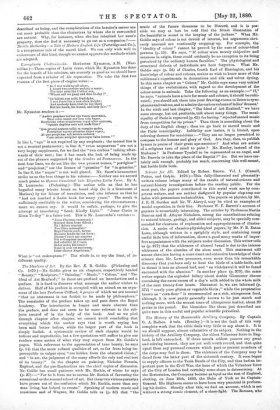The Idealism of Art. By the Rev. A. R. Goldie.
(Pickering and Co. 1879.)—Mr. Goldie gives us six chapters, respectively headed "Beauty," "Sculpture," "Painting," "Music," "Colour," and "The Ideal of Art Realised ;" to these are prefixed an introduction and a preface. It is hard to discover what message the author wishes to deliver. Half of his preface is occupied with an attack on an argu- ment of the late Professor Clifford, a propos of which we are assured "that no statement is too foolish to be made by philosophers." The remainder of the preface takes up and pute down the Royal Academy. The introduction is longer and more obscure than the preface, and does not seem to be more relevant to the sub- jects treated of in the body of the book. And as we plod through chapter after chapter, we cannot avoid concluding that everything which the author says that is worth saying has been said better before, while the larger part of the book is simply foolish. A systematic review of each chapter would be tedious and unprofitable, but a few quotations will suffice to give our readers some notion of what they may expect from Mr. Goldie's pages. With reference to the appreciation of true beauty, he says (p. 14) that the more refined qualities of art, so far from being im- perceptible to vulgar oyes, "are hidden from the educated vision ;" and "in art, the judgment of the many affords the only and real test of its beauty." In the chapter on painting, Nicholas Poussin, - Raphael, and the pre-Raphaelites are the chief topics of discussion. Mr. Goldie has small patience with Mr. Ruskin, of whom he says (p. 37) :—" Far be it from me to accuse Mr. Ruskin of favouring the sensational or the sensual school of art. But these two vicious parasites have grown out of the confusion which Mr. Ruskin, more than any man living, has helped to create." Speaking of modern music and magicians and of Wagner, Mr. Goldie tells us (p. 50) that "the music of the future threatens to be Discord, and it is pos- sible we may at last be told that the fittest illustration of the beautiful in sound is the braying of the jackass." What Mr. Goldie says of colour is not devoid of interest, but arguments obvi- ously unsound are continually cropping-lip. For example, the "ideality of colour" cannot be proved by the case of colour-blind persons (p. 53). He says, "If colour were merely subjective and sensuous in origin, there could evidently be no exception to its being perceived by the ordinary human faculties." The physiological and structural defects of individuals are here forgotten. What Mr. Goldie says (p. 56) of Charles, fourth Earl of Harrington, and his knowledge of colons and colours, makes as wish to know more of this nobleman's experiments in decorations and silk and velvet dyeing. In this same chapter on "Colour," Mr. Goldie says some very unkind things of the evolutionists, with regard to the development of the colour-sense in animals. Take the following as an example :—"If,"' he says, "animals have a taste for music and colours, it should be culti- vated; you should ask them into your drawing-rooms to listen to sym- phonies and waltzes, and to admire the various colours of ladies' dresses.' In the sixth and last chapter, "The Ideal of Art Realised," we have some strange, but not profitable, talk about many things. The muni- cipality of Paris is reproved (p. 65) for having "rejected sacred music from competition for its prizes." Then there is something about the duty of the English clergy ; then we go back to sacred music and the Paris municipality. Infidelity now insists, it is hinted, upon selecting themes for musicians :—" They are no longer permitted to compose to the honour and glory of God. Are they, then, to publish hymns in praise of their great ape-ancestor ? And what are artiste of a religious turn of mind to paint ? Mr. Huxley, instead of the Madonna ? Is Professor Tyndall to be represented as an angel, and Mr. Darwin to take tile place of the Baptist ?" &c: But we have cer- tainly said enough, probably too much, concerning this well-meants. but feeble little book.


































 Previous page
Previous page